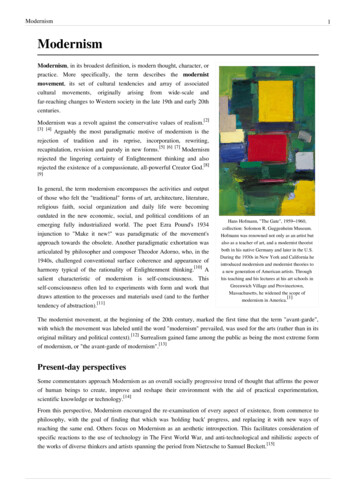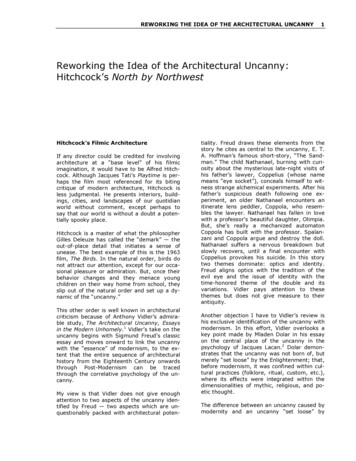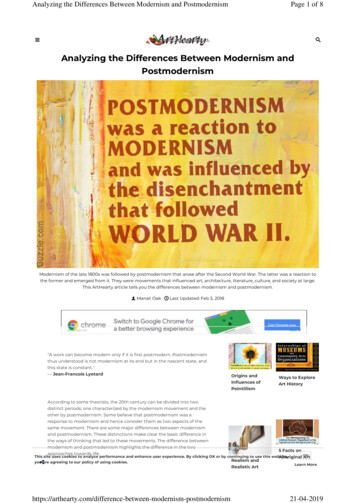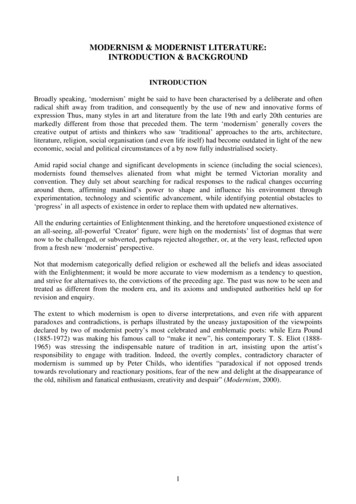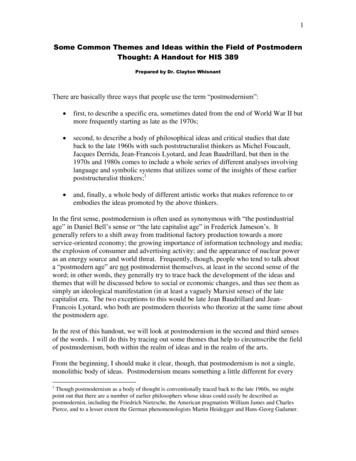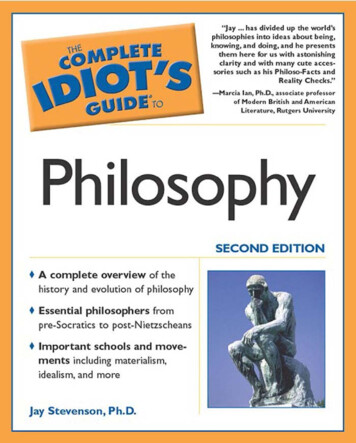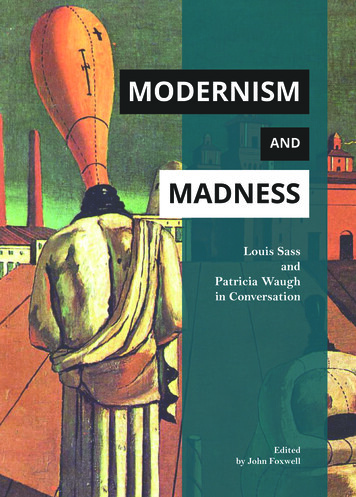
Transcription
MODERNISMANDMADNESSLouis SassandPatricia Waughin ConversationEditedby John Foxwell
An IntroductionLouis Sass is Professor of Clinical Psychology at Rutgers University; Patricia Waugh is a Professorin the Department of English Studies at Durham University. What follows is the edited transcriptof their public conversation at the “Twenty-Five Years of Madness and Modernism” symposium,held on 11 May 2018 at Durham University. This symposium, organised by Angela Woods,celebrated both the twenty-fifth anniversary and the new edition of Sass’ landmark studyMadness and Modernism: Insanity in the Light of Modern Art, Literature, and Thought. Theconversation was transcribed by Jo Porter and edited by John Foxwell, Louis Sass and PatriciaWaugh. The event was supported by Hearing the Voice and the Institute for Medical Humanities,both funded by the Wellcome Trust.“Modernism and Madness: Louis Sass and Patricia Waugh in Conversation”First published by Hearing the VoiceDecember 2018Hearing the VoiceDurham University, UKCopyright Hearing the Voice 2018All rights reservedEditors: Louis Sass, Patricia Waugh and John Foxwellwww.hearingthevoice.orgThis work is licensed under the Creative Commons Attribution 4.0 InternationalLicense. To view a copy of this license, visit the website or send a letter to CreativeCommons, PO Box 1866, Mountain View, CA 94042, USA.Cover image: The Disquieting Muses by Giorgio de ChiricoAbout the AuthorsLouis Sass is a Distinguished Professor in the Department ofClinical Psychology, Rutgers University (New Jersey, U.S.A.), wherehe is also associated with the Program in Comparative Literatureand the Center for Cognitive Science. In addition to Madness andModernism, he is the author of The Paradoxes of Delusion:Wittgenstein, Schreber, and the Schizophrenic Mind, and of manyarticles on schizophrenia, phenomenological psychopathology,hermeneutics, psychoanalysis, modernism/postmodernism,Wittgenstein, and Heidegger. Sass is a past president of the divisionof Psychology and the Arts and also of the division of Philosophyand Psychology of the American Psychological Association. In2010 he received the Joseph B. Gittler Award from the AmericanPsychological Foundation for “the most scholarly contribution to thephilosophical foundations of psychological knowledge.” The revisededition of Madness and Modernism (Oxford University Press)received the BMA: British Medical Association First Prize for the bestbook in psychiatry in 2018.Patricia Waugh is a literary critic and Professor of EnglishLiterature at Durham University (UK), where she is also a coInvestigator on the Hearing the Voice project. She is a leadingspecialist in modernist and postmodernist literature, postmodernisttheory and feminist theory, intellectual history, and postwar fictionand its political contexts. Waugh is notable as one of the first criticsto work on metafiction and, in particular, for her influential 1984study, Metafiction: the Theory and Practice of Self-ConsciousFiction. She was a member of the Northern Arts Literature Panel(now North-East Arts), is a founding fellow of the English Association,and contributed to the Chief Scientific Adviser’s Report to theGovenment on Science in 2015 arguing the case for the importanceof the humanities to scientific development. In 2016 she was made aFellow of the British Academy.Louis Sass and Patricia Waugh in Conversation3
METAFICTION AND HYPERREFLEXIVITYPatricia Waugh – So I want to start with a quotation from Madness and Modernism.You describe the aim of the book as ‘offering a complete account of schizophrenics’subjective life, modes of existence and expression through developing a comparativephenomenology’. So I thought we might start off by talking a little bit about thegenesis of the book and about how, twenty-five years ago, before interdisciplinarityhad become institutionalised, you began this practice of comparative phenomenologyand how that really emerged out of your incredible range of reading and engagementwith philosophy and the arts, but also out of your own clinical practice. And I thinkalso the point that you make in the book is that you interpret phenomenology notsimply as a descriptive term, but as constituting a kind of pathogenic model, and alsoas a way of bringing all these different disciplines together. So I thought maybe wecould begin with you talking a little bit about some of the challenges and the greatestrewards of developing this comparative phenomenology and how you understand thatterm, and the kind of methodology that underpins the book.PW – So that’s interesting; that experiential aspect to it was important LS – those things came together. And then I got the idea, well wow, a lot of these thingsI had been studying in literature, T. S. Eliot, Wallace Stevens, and other avant-garde 20thcentury writers, all these seemed to me to offer very close parallels to schizophrenia.Actually, that idea is in a way already present in Laing’s Divided Self, where he draws a contrastbetween the characters in Shakespeare and the romantics versus the characters in Kafka,pointing out that the characters in Kafka suffer from a kind of ontological insecurity that issimilar to what you find in schizophrenia.Louis Sass – Right, OK. There are a lot of different questions there, and I guess one of themasks me to wax a little bit autobiographical Madness and Modernism came out twenty-fiveyears ago, but it was really thirty-five years ago that I started working on it seriously, and evenbefore that I was thinking about some of the themes.PW –So he’s making that contrast with romanticism as well So where did the idea come from? What was the book’s genesis? I was an English major asan undergraduate, and as I like to say, I never got over it. My heart really is in the humanitiesand philosophy, and especially literary studies – that’s the perspective that comes mostnaturally to me, and that I suppose I respect the most, at least in the study of things human.So, in that sense, one might wonder: why did I go into the field of psychology in the firstplace? And the simple answer to that is that I didn’t really know what I was doing when I wastwenty years old, thinking about graduate school. I had taken a couple of psychology courses,and I’d stumbled somehow into a philosophy course on Husserl and Merleau-Ponty, whereI was particularly impressed by Merleau-Ponty’s Phenomenology of Perception. Somehow Ithought that psychologists would all be interested in Merleau-Ponty – how could they not be?– he was so fascinating! But I discovered when I got to Berkeley (where I did my doctorate inpsychology) that hardly anyone in the department seemed to have heard of him. That wasthe beginning of my rocky road as a student of psychology and later clinical psychology, fromwhich I dropped out several times, almost leaving the field.In any case, a lot of these things came together for me and led me to think of the idea ofwriting on madness and modernism.So, the idea of looking at something like psychopathology from a literary, humanistic,philosophical point of view came very naturally to me, because that’s the way I thought aboutthings beforehand. As for the interest in schizophrenia in particular: that was, in the latesixties, one of the really hot topics. I mean, there was sex, drugs, rock and roll, and madness– at least in terms of the things that a lot of people were very interested in. So it was just verynatural to be interested in that topic. I was also influenced by a book that was widely read inthose days: The Divided Self, the one great work by R. D. Laing, in my opinion.PW – Which also influenced a lot of writers, actually LS – And so I read that and I guess, perhaps having a few schizoid characteristics myself –at least in the broad sense of those terms (as defined by Guntrip and Fairbairn, who had4influenced Laing) – I found it easy to identify with a lot of things that Laing was describing andjust found it all very revelatory. I also had some experience working in a mental hospital withpeople with schizophrenia, and the things that I was hearing and reading about how I wassupposed to understand these patients never made much sense to me – not with regard tothe patients I encountered in the hospital, and especially not regarding a close friend whom Iknew from high school and who’d had a schizophrenic break during the college years; well just the idea that he was somehow either demented or quasi-demented or or regressed tosome kind of infantile or child-like state – all that was just so utterly contrary to everythingthat I experienced with him, so Modernism and MadnessLS – With romanticism, yes, and also with Shakespeare. But he doesn’t develop it at all; it’s justa passing comment in his bookPW – I think I came to your work through writing a book of my own: my first book,which came out of my PhD and was published in 1984.LS – Is that Metafiction?PW – That’s Metafiction, which is sub-titled The Theory and Practice of Self-Conscious Fiction.I was really interested in this issue of formal self-reflexivity in art and literature. Andin fact I began that book by lifting a quotation from the American postmodernist, JohnBarth, who had ended one of his fictional works with the words: ‘Oh God comma Iabhor self-consciousness’. And I started to feel a bit like that myself, when I got to theend of my own book and had been immersed for so long in self-reflexivity! Of course,what Barth’s sentence is doing, its point, is what became familiar in the postmodernjargon as a ‘performative contradiction’; but it’s also a paradox of self-reference in thathe spells ‘comma’ rather than using a comma. So it foregrounds language, even as he’sdenying it: it’s foregrounding, autonomising language, in that way that you talk about.But I think when I came to your book, having thought about this in a formal sense inrelation to literature and paradoxes of self-reference in philosophy – those of Russelland the analytic tradition – to me it was your lynchpin concept of hyperreflexivity thatbetter performed this job, with regard to the literary as well as the experiential. And itseemed to me, when afterwards I became interested in phenomenology, it answered towhat Jaspers saw as his inability to find the central factor in schizophrenia, despite allthis work he’d done on Wahnstimmung and perceptual change and shifts in experienceas he tried to describe schizophrenia. So, this important and central concept ofhyperreflexivity: how did that emerge as a concept as you tried to bring these differentdiscourses together?Louis Sass and Patricia Waugh in Conversation5
Obviously it’s a term that, since the first publication of the book, has been interpretedin different ways.LS – Right.PW – And I think often misinterpreted as well.LS – Right.PW – So if you could say a little bit about the centrality of that term, its genesis andthen its legacy.LS – Well maybe I should start with the last thing you said, which is the misunderstanding ofthe term, and then go back to where it came from. Some people have assumed that the term‘hyperreflexivity’ refers only to a reflective, introspective, intellectual, and largely volitionalkind of self-consciousness. But I meant the term to be broader in scope. Yes, it would includewhat might be called reflective hyperreflexivity, but it would also include more automatic or‘operative’ kinds of hyperreflexivity. So, instead of ‘operative intentionality’, which is a phrasefrom Husserl and Merleau-Ponty, we can speak of operative hyperreflexivity. That would bethe kind of hyperreflexivity that, so to speak, just happens to you. It is primarily experiencedin a passive and automatic manner, as a popping out, you might say, of sensations that youwould not normally notice in a focal way – like the sensations in your shoulder, say, as youmove your arm, which then emerge into focal awareness, for who knows what reason, maybehaving to do with some neurobiological abnormalities often. But anyway, they begin to popout into consciousness and to call attention to themselves. And that can lead to a kind ofdefensive hyperreflexivity of a more reflective type. It can lead to it almost immediately, as amatter of fact, and probably often does. But it can also lead to it in a more long-term sense,later in life, perhaps especially in the stage of what Piaget called ‘formal operations’, whichis defined by a capacity to think about thinking – since it’s then that other, more intellectualforms of hyperreflexivity come into play. This isn’t the whole story, but my view is thatschizophrenia does involve a combination of these two different kinds of events occurring.Of course, this is an over-simplification, almost cartoonish in fact. Probably there is no verysharp line between these two forms of hyperreflexivity. Nevertheless, it’s a useful distinction.In any case, hyperreflexivity does involve, at the most basic or foundational level, thisoperative hyperreflexivity, which may well have genetic and neurobiological sources – asI have argued elsewhere (in our 2018 article in Schizophrenia Bulletin, “Varieties of selfdisorder”).So that’s the clarification of the concept.PW –Yes, because I think, for me, thinking about metafiction as a kind of dominantof postmodernism for example, it seemed that the kind of reflexivity that’s involvedin all writing of imaginative fictions engages in what I called ‘the creative/descriptiveparadox’. You’re creating a world that you’re appearing to describe through the act ofdescribing it. So you’re effectively living in a double-bookkeeping condition.LS – Right.PW – And mostly what happens in modernism, I think, is that language isforegrounded, so those paradoxes of self-reference gradually come to the fore. Andby the time we get to something like metafiction and postmodernism, it has almostbecome operant. So metafictional writers are constantly laying bare the device, evenmore perhaps than modernism LS – Right, I would say that reflective hyperreflexivity has been, paradoxically enough,almost automatised But still, it would be more like the reflective kind of hyperreflexivity inmetafiction because it starts out with a kind of intellectual and partially volitional awareness.But that, like anything else, can become habitual.So we do have a potential problem here. It’s a problem that is very common inphenomenology because language did not develop, alas, in order to let us bephenomenologists. We bend language to phenomenological purposes, but it developed forother reasons entirely. So, in French and Spanish for example, which I’m most familiar with,it’s really hard for people to come up with the distinction between what I am calling operativePW – Yes, I think so. But recently, working on Virginia Woolf, I also noticed one of theinteresting things is that, in her diary, she explicitly describes the immersive quality ofwriting and building a fictional world in double-bookkeeping terms: how she surfacesdisoriented from the slow building and emergence of a fictional world that comesout of this immersion in the ‘queer region’, as she calls it, that is creative writingand imagining. And when she’s surfacing from this ‘queer place’, the world outsiderecedes and even seems to resist what Lily Briscoe calls ‘the razor edge of balance’ thatkeeps the perceptual world and the worlds of imagination and memory in productivetension with each other. Her fiction is also full of characters in states of absorptionand dissociation who are shocked back into the perceptual world by interruptions gunshots, bangs, backfiring cars, and so on. Woolf knew that writing, like madness,was for her both ‘soothing’ (as in lulling or trance-like), and precarious, disturbing anynormally operant sense of the perceptual world as ontologically dominant. I meanthat the fictional world, often driven by memory, has become so powerful that innersensing has overwhelmed her sense of pre-reflective embodiment in time and space.And I think you also find this idea in novels like Beckett’s Watt, for example, wherethe frame shifts and you don’t know whether the protagonist is intentionally involvedin an act of recollection, whether he’s perceiving something in the real storyworld, orwhether it’s in his imagination. And Woolf describes that process very, very powerfullyand in detail across her fictional and non-fictional writing. So I think there’s a kind ofbasis in the experience of writing and creating imaginary worlds that comes close toModernism and MadnessLouis Sass and Patricia Waugh in ConversationBut some people have understood ‘hyperreflexivity’ to mean only the reflective kind – asif I were saying that, somehow, schizophrenia was just an intellectual detachment andwithdrawal defence, and nothing more than that. And that was really a misunderstanding ofthe term. By the way, most people here, I guess, are native English speakers, but one thingI’ve learned in my travels (especially living and teaching in Spanish- and French-speakingcountries), is that it’s even harder to make this distinction clear in Romance languages. Infact, in various languages you don’t have the distinction that you have in English betweenreflective with ‘ct’, and reflexive with an ‘x’. Even in English, these words are used in manydifferent ways. Because, after all, the term reflexive could refer to the very automatic eventthat happens when the neurologist bumps your knee to check your reflexes, or, at the otherextreme, it could be the reflexivity inherent in Immanuel Kant’s recognition of the mind’sconstituting role in experience.6versus reflective forms of hyperreflexivity. In the preface to the revised edition of Madnessand Modernism, by the way, I have a note where I give a suggested vocabulary in French,Spanish, Italian, and German, and most of those suggestions involve locutions that arepossible but not standard in those languages.7
this experience, the double-bookkeeping experience, that is powerfully reflected inmodernism and then formally reflected in the operationalisation of the hyperreflectivein metafiction.I think when your book came out it was an interesting moment in literary and culturalstudies, and the humanities in general. It was the year of the infamous ‘Sokal Hoax’ Idon’t know if you know about the Sokal Hoax ?LS – Right.LS – Well, they got an article accepted in Textual Studies or something ? Was it Social Text? Yes,I remember that.PW – But I’m glad you pulled out that distinction, because I think it’s a really importantone, isn’t it, in terms of understanding your concept?LS – Maybe it’s more important in the psychiatric context than in the cultural literary one.That’s why, even though I do indeed make this distinction in Madness and Modernism, I wasn’tperhaps as clear or as emphatic about it as I should have been – at least in the first edition. Inthe revised edition, especially in the new preface, I do try to make this clearer. The distinctionis important in the psychiatric context, for instance, if you’re trying to develop a pathogeneticmodel capable of generating plausible scientific hypotheses about how schizophrenia mightdevelop. Because they’re quite different really: something that sort of happens to the person,and something that’s more of a reaction, one of the sequelae, in medical terminology, of amore originary phenomenon. If you want to think about what the neurobiological correlateswould be, for instance, then you do need this distinction, it’s very important.In the first edition of Madness and Modernism, I wasn’t yet so concerned with this issue.What I really wanted to show there was that, contrary to what people usually say aboutschizophrenia – that it’s a demented, regressive or Dionysian condition – it actually involvesthese self-conscious or hyperreflexive processes and experiences. Whether the processeswere operative or reflective, whether primary or secondary, wasn’t the main thing I wasconcerned with in Madness and Modernism. It did become very important afterwards, becausea lot of what I’ve done in the last couple of decades has involved pathogenetic modelling andso on.You also asked where the idea of hyperreflexivity came from – and I think for me, some of thethings I was reading, some of the things that you were writing about You know, I wrote myundergraduate thesis on Vladimir Nabokov’s novel Pale Fire PW – Oh that’s very LS – which is a very reflexive work.PW – Yes, it certainly is.8PW – Social Text. It was a hoax article that was taken seriously, and it was basically aparody of postmodern theorising. But it was also at the end of the high point of socalled ‘Theory’ and the love affair with Derrida. And after that hoax event and theresponses to it, cultural intellectuals started questioning, ‘Is it the end of Theory?Where do we go next, etc.?’ Well of course one of the directions we’ve gone, inliterary studies, has been back to phenomenology, though recast somewhat via postclassical narratology and the latest wave of cognitive science. I mean, a long timeafter you wrote your book, literary studies – somewhat belatedly – rediscoveredphenomenology as part of the affective turn, picking up 4E Cognition, emotion,embodiment, embeddedness, enactivism, the body, the extended mind. It’s a newparadigm of which Ian Hacking has been somewhat dismissive: he refers to it asa mode of inverted Cartesianism. So according to him, we’ve gone from being allmind to being all body, and somehow we still have yet to join them up satisfactorilyin our thinking about mind-body. The dominant paradigm in literary studies at themoment encompasses this affective, experiential turn even as it extends to culturalecologies, postcolonialisms, posthumanisms and the like. So phenomenology hasmade a powerful return in the shape of these various Neo-phenomenologies. Andalso even in terms of postmodernism David Foster-Wallace famously renouncedpostmodernism in the 1990s, saying how we’ve now had too much irony, we’ve had toomuch hyperreflexivity, and this provided the cue for what’s now referred to as the ‘newsincerity’. We’ve now got the Memoir Novel, and we’re back to confessional culture(albeit of a new kind), confessional art, life writing, the revival of the tacit and the ideaof scepticism as corrosive to belief, intimacy, faith. For example, in New Literary History,one of the leading journals in the field of literary and cultural studies, there’s beenan intellectual debate going on around the concept of post-critique: that instead ofbeing locked into postmodern linguistic scepticism and anti-foundationalism, we haveto recover art as wonder, immersion, feeling, embodiment. So we’re in this differentmoment, I think, from the moment when the first edition of your book appeared, thatwe might recognise as the post-postmodern.LS – And I think that for most of us who are intellectually oriented (perhaps I can speakcollectively for many of the people in this room), the fascination of the reflexive is almostirresistible. Maybe not to the same extent in the natural sciences But if you’re studying thehuman, and if you’re an intellectual in the twentieth or twenty-first century, how can you notbe interested in the meta? After all, it gives you the feeling: ‘Now I’m understanding, reallyunderstanding, what was only taken-for-granted before’ – and of course that always feels likeyou’re getting to something that’s more profound. But it can also be dangerously seductive,can lead you down unfortunate pathways. For me, a good example of that would be a fairbit of the writing of Jacques Derrida – who, brilliant as he can be on certain issues, is just soirritatingly reflexive, endlessly glorying in the same meta-moves.But what I’m interested in is how most of those theorists who we tend to associatewith the high Theory, the textualism, of the eighties and nineties – Foucault, Derrida,Lacan, many others – actually came out of phenomenology, and either disavowed orturned against what they saw as its limits and blindnesses, though I think sometimesthey have misrepresented it. So Derrida, for instance, talks about the metaphysics ofpresence, launches an assault on voice, and substitutes writing for voice by assumingthat voice is the source of our illusory sense of full and unified presence to ourselves.Whereas in fact, you know, on the ‘Hearing the Voice’ project, what we’ve been lookingat is how inner speech – first discussed by pragmatists such as James, Dewey, Peirce,and Mead, and psychologists such as Vygotsky – is mostly dialogic and plural, entangledwith the voices of others and what Mead calls the ‘generalised Other’, and is neverstraightforwardly private or a source of secure self-presence.PW – Yes, I mean Fredric Jameson calls it ‘the pathology of auto-referentiality’. Butactually the mention of Derrida takes me on to what I wanted to ask you about next.So I suppose what I’m asking is – because you look at many of those thinkers in Madnessand Modernism – why do you think there was that desire to disavow phenomenology atModernism and MadnessLouis Sass and Patricia Waugh in Conversation9
that point? Or to suggest there was this new revolutionary moment, sometimes called‘the linguistic turn’ or ‘the textualist turn’? We’re now recovering phenomenology, soI think in literary studies this will be the moment when we really catch up with andrecognise the force of the insights of your book and what it’s saying, because we’renow at last – somewhat paradoxically – caught up with what you were doing!PW – And I think it’s related to the so-called linguistic turn that was happening in anumber of intellectual traditions. I mean the kind of emergent social constructionismof the sixties, foregrounding mediation and the materiality of the text and of language.LS – Oh, well that would be wonderful.LS – But if you look at Foucault and Lacan, that’s not a sufficient explanation, I think because, for example, how much of Foucault is really about language? Not that much,actually.PW – Even though I’ve been teaching it for twenty-five years PW – No, not the concept of discourse even.LS – I would be delighted if that were to happen. I would love to have more of a presence inliterary and cultural studies.LS – And Lacan I mean, there’s the Symbolic, yes.First of all, I agree with a lot of things you’ve just said. In fact, I’ve recently written a briefarticle on Foucault and Lacan, and a longer one on Lacan, arguing that if you reallyunderstand these writers, contrary to what they themselves said, the phenomenologicaltradition is absolutely crucial in their work. If you read the various histories of recent Frenchthought, they all talk about the ‘grande coupure’: the great cut or gap that supposedlyoccurred between the period of existential phenomenology and the advent of structuralism(with structuralism almost immediately turning into post-structuralism). Often they saythat Foucault’s book Les mots et les choses (translated as The Order of Things) was the crucialtext marking this transition. But if you read Les mots et les choses, it turns out to be veryHeideggerian PW – It is, very much so.LS – It’s so obviously Heideggerian. The ‘B’ word, ‘Being’, you know, is all over the placethroughout the book; it’s particularly obvious in the preface, where Foucault signals that heis doing what Heidegger said one should do, which is to understand the different modesof Being (which might as well be written with a capital ‘B’), that are experienced in differentperiods of history. For instance, he writes that he wants to study ‘the pure experience oforder and of its modes of being’. So the idea that that’s non-phenomenological I mean, last Iheard Heidegger was part of the phenomenological tradition!PW – Yes.LS – And people who were obsessed with the linguistic turn put great emphasis on that; butLacan also postulates the Real and the Imaginary, the whole of point of which is that they’renot linguistic – and they’re just as central, just as important to take into account. So it maybe that, on some vague grounds, people accepted that the ‘discovery’ of language meantthat you had to reject phenomenology, but I don’t think it was ever a very cogent thought ontheir part. Also, I have always thought, ‘How could you not be interested in phenomenology?Are you seriously telling me you’re willing to reject the whole project of trying to imaginewhat human experience is like – in its essence and in its varieties?’ OK, maybe you don’t likeHusserl or maybe you don’t like Sartre, but the general project of understanding and tryingto describe the nature of human subjective life, difficult as it is – that’s phenomenology in thebroadest sense. The very idea that this should be rejected, or could even be rejected, even ifone wanted to – that has always seemed implausible to me.PW – Yes.LS – So I think I’m quite happy to have been interested in a lot of fields, but also marginal tothem. I do think there’s a great advantage to not being at the centre. Staying on the marginsof things, whether that would be literary studies, clinical psychology, or philosophy: it helpsyou from taking too seriously all that you’re supposed to think.And then consider Lacan as well – what he’s talking about regarding the Imaginary, theSymbolic, and the Real. Well, these can best be understood as something like Heideggerianmodes of Being. The great contribution of Lacan, in my opinion – and in this he goes wellbeyond Heidegger – is that he shows how a single individual can actually experience threedifferent modes of Being, and how the modes interact in all sorts of ways. The idea that thiswas a rejection of phenomenology ! Was it just Parisian politics? Was it all a product of theanxiety of influence in Paris at the time?PW – Well yes, it could be LS – And then for the Parisians, bless their souls – because I’m a great Francophile, but I’malso sometimes critical of them, as they are of each other, of course – the trendiness inFrench intellectual thought
book in psychiatry in 2018. Patricia Waugh is a literary critic and Professor of English Literature at Durham University (UK), where she is also a co-Investigator on the Hearing the Voice project. She is a leading specialist in modernist and postmodernist literature, postmodernist theory a
